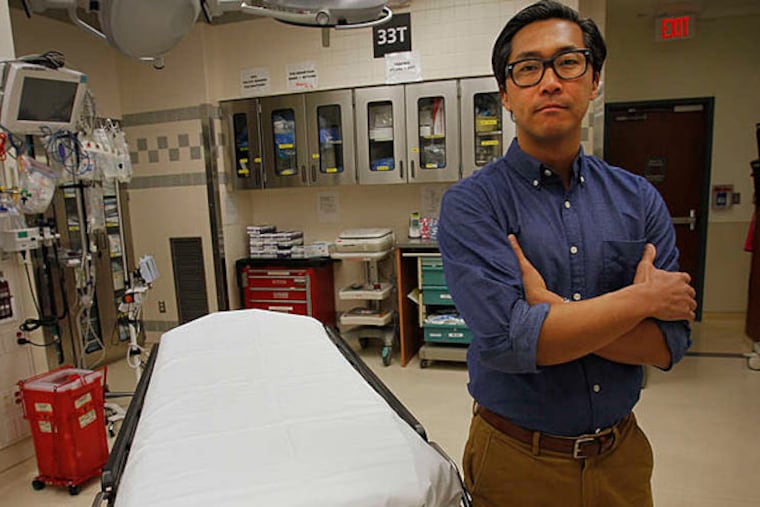
DR. BON KU, a laid-back father of two, works the Jefferson emergency room. It's a rare night that he doesn't see a patient he saw only a few days or weeks before. That's because many of his patients live on the streets.
He knows many of the city's homeless by name, many more by face and ailment. The guy on the corner, he treated for a bad cough. The guy down the street, pneumonia.
Not that long ago, he noticed that another man he had treated for pneumonia had been admitted to the hospital.
"I guarantee you that if this guy had a house, access to a place to recover, this wouldn't have happened because he could have recuperated," he said.
Sometimes, after not seeing a regular patient for a while, he finds out why. Too often, he spots the name on a list of the dead; he's part of a medical team that reviews the deaths of homeless people in the city.
He treats the homeless repeatedly in a frustrating and costly revolving door of emergency-room health care that's repeated in ERs across the country.
In response, many states have started medical-respite programs, places where homeless who are too sick to recover on the streets, but not sick enough to be in a hospital, can get well.
There are centers in major cities across the country. Baltimore. Chicago. Los Angeles. New York. Boston has the first and largest recovery center with the 104-bed Barbara McInnnis House.
Philadelphia has none.
When Dr. Ku first told me that, I thought he was mistaken. This is one of the nation's poorest big cities, and on any given day there are 4,000 homeless in shelters and on the streets, many of whom repeatedly use the emergency rooms as their primary, and only, health-care source.
A safe and sanitary recovery center is a no-brainer.
And yet, other than some meetings here and there where everyone agrees - oh, yes, it's a worthy cause, but oh, no, where is the space and funding going to come from? - Dr. Ku's efforts to open a center have fizzled.
Dainette Mintz, director of the city's Office of Supportive Housing, participated in early conversations about a center. She's still for it. But she and other city officials said money is a huge challenge.
Fair enough. But at a time when everyone is debating health-care reform, how are we not taking such a common-sense step? How are we not among the cities under similar financial constraints which have managed to do so?
Sabrina Edgington, program and policy specialist at the National Health Care for the Homeless Council, said most programs around the country are paid for through a patchwork of funding. About half are funded by hospitals.
Bottom line: It can be done. It should be done.
And it will cost us even more if it's not done. Dr. Ku, who is also an assistant professor of emergency medicine at Jefferson, studies the costs associated with homeless patients who frequent emergency departments. In one year, he found that the homeless man who used the ER most racked up about half a million dollars in hospital charges. That's one extreme case. But then so is how we treat sick homeless individuals.
According to the latest report, 90 homeless men and women died in the city between 2009 and 2010. More than 70 percent had at least one known chronic physical medical condition; 61 percent had no health-care coverage.
In Boston and Chicago, respite programs led to a 50 percent reduction in emergency-room use among those with access to the recovery services. That's a lot of money.
"It's a population that traditionally the public doesn't care about," Dr. Ku said. "It's a sad commentary on who we are as a society that these are just an untouchable population that we just don't even want to deal with. I have to deal with them on a daily basis, and so I have to do something."
Phone: 215-854-5943
On Twitter: @NotesFromHel